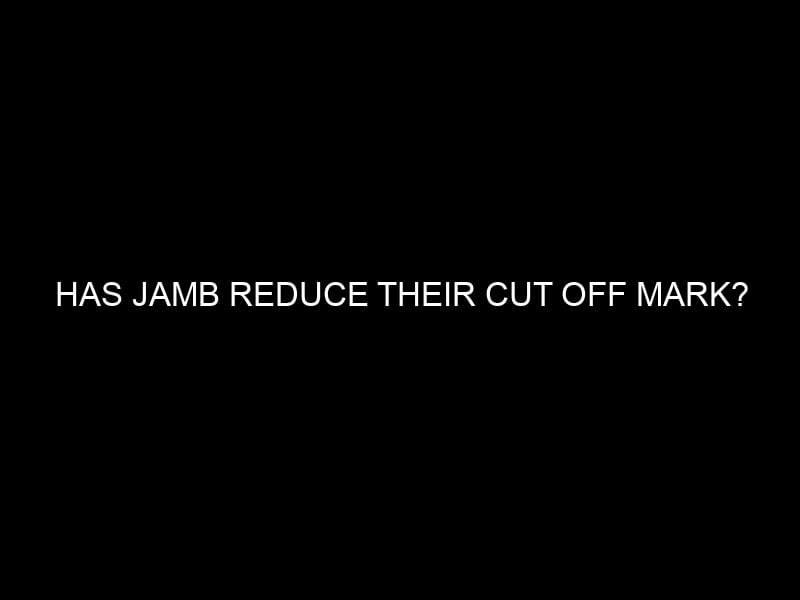Yes, JAMB (Joint Admissions and Matriculation Board) has reduced its cutoff marks for admission into tertiary institutions in Nigeria. The board announced a new minimum cutoff mark for admission into universities, polytechnics, and colleges of education for the 2021/2022 academic session.
In this article, we will discuss the new JAMB cutoff marks, their implications, and the factors that influenced their reduction.
What are JAMB Cutoff Marks?
JAMB cutoff marks are the minimum scores required for admission into tertiary institutions in Nigeria. The scores are set by the Ministry of Education in conjunction with the heads of the institutions and are based on various factors such as the number of available spaces, the number of applicants, and the overall performance of the candidates.
JAMB conducts the Unified Tertiary Matriculation Examination (UTME), which is the primary requirement for admission into Nigerian universities, polytechnics, and colleges of education. Candidates who score above the cutoff mark and meet other admission requirements can apply for admission to any tertiary institution in Nigeria.
JAMB Cutoff Marks for 2021/2022 Academic Session
In June 2021, JAMB announced a new minimum cutoff mark for admission into tertiary institutions in Nigeria. The new cutoff marks are:
- Universities: 160
- Polytechnics: 120
- Colleges of Education: 100
This represents a reduction from the previous cutoff marks of 180 for universities, 150 for polytechnics, and 100 for colleges of education.
Implications of the Reduction in JAMB Cutoff Marks
The reduction in JAMB cutoff marks has several implications for the Nigerian education system. Here are some of the implications:
- Increased Access to Tertiary Education: The reduction in cutoff marks may increase access to tertiary education for more candidates who may have scored below the previous cutoff marks. This could lead to increased enrollment in tertiary institutions in Nigeria.
- Lowered Admission Standards: The reduction in cutoff marks may lower admission standards for tertiary institutions in Nigeria. This could lead to a decline in the quality of education and an increase in the number of unqualified graduates.
- Increased Competition: The reduction in cutoff marks may lead to increased competition for admission into tertiary institutions in Nigeria, as more candidates who scored above the new cutoff marks would apply for admission.
- Improved Equity: The reduction in cutoff marks may improve equity in the Nigerian education system, as more candidates from disadvantaged backgrounds may have a better chance of gaining admission into tertiary institutions.
Factors that Influenced the Reduction in JAMB Cutoff Marks
Several factors influenced the reduction in JAMB cutoff marks. Here are some of the factors:
- COVID-19 Pandemic: The COVID-19 pandemic disrupted the Nigerian education system, leading to the closure of schools and the postponement of the 2020 UTME. The pandemic also affected the preparation and performance of candidates in the 2021 UTME, leading to a lower overall performance.
- Low Enrollment: Tertiary institutions in Nigeria have been experiencing low enrollment in recent years, leading to a decrease in revenue and the closure of some institutions. The reduction in cutoff marks may be a strategy to increase enrollment and revenue for the institutions.
- Pressure from Stakeholders: There has been pressure from various stakeholders, including parents, students, and politicians, to reduce the JAMB cutoff marks to increase access to tertiary education.
- Inadequate Preparation: Some candidates may not have had adequate preparation for the UTME, leading to a lower overall performance. This could be due to factors such as inadequate study materials, poor teaching quality, and lack of access to technology for online learning.
Conclusion
In conclusion, JAMB has reduced its cutoff marks for admission into tertiary institutions in Nigeria for the 2021/2022 academic session. The new minimum cutoff marks are 160 for universities, 120 for polytechnics, and 100 for colleges of education. The reduction in cutoff marks has several implications for the Nigerian education system, including increased access to tertiary education, lowered admission standards, increased competition, and improved equity.
The reduction in JAMB cutoff marks was influenced by several factors, including the COVID-19 pandemic, low enrollment, pressure from stakeholders, and inadequate preparation. It is important to note that the reduction in cutoff marks does not guarantee admission into tertiary institutions, as candidates must also meet other admission requirements such as providing the necessary documents and passing any additional admission tests or interviews.
Candidates who have scored above the new cutoff marks and meet other admission requirements can apply for admission to any tertiary institution in Nigeria. It is important for candidates to prepare adequately for the UTME by studying the necessary materials, attending preparatory classes, and improving their test-taking skills.
Tertiary institutions in Nigeria must also take steps to maintain their admission standards and provide quality education to their students. This includes improving their teaching quality, providing adequate facilities, and adopting innovative teaching methods to enhance learning outcomes.
In conclusion, the reduction in JAMB cutoff marks is a significant development in the Nigerian education system. While it may increase access to tertiary education for more candidates, it is important to ensure that admission standards are maintained, and the quality of education is not compromised. Candidates must also take responsibility for their preparation for the UTME to increase their chances of success in gaining admission into their preferred tertiary institution.

